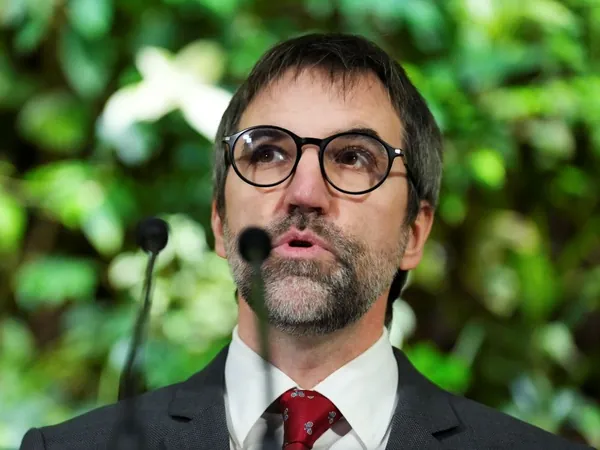
Australian Social Media Ban for Kids Sparks Interest in Quebec: A Potential Cultural Shift?
2024-11-29
Author: William
Australia's Social Media Ban
Australia's recent decision to prohibit children under 16 from accessing social media platforms has sent shockwaves across the globe, prompting Canada's Quebec province to reconsider its stance on this contentious issue. This groundbreaking legislation could set a precedent for other regions grappling with similar youth-related challenges.
Quebec's Response to Australia's Legislative Changes
In response to Australia's move, the provincial government of Quebec initiated discussions last spring on establishing a minimum age requirement for social media accounts. This initiative was largely driven by the youth wing of the governing Coalition Avenir Québec (CAQ), who have noticeably increased pressure for regulatory changes in the digital landscape.
Legislation Details
The Australian Senate's approval of the law last Thursday marks a pivotal moment, as it positions Australia as the first country worldwide to enact such a measure. According to the law, social media platforms like TikTok, Facebook, and Snapchat will now be liable for hefty fines—up to $45 million—if they fail to prevent users under the age of 16 from creating accounts.
Reactions from Quebec Politicians
Aurélie Diep, president of the youth wing of CAQ, expressed optimism about the implications of Australia's decision: “We were thrilled to see this approved by the Australian government. It gives us hope for what we are proposing here in Quebec. This is very encouraging news.” The conversation took an interesting turn when Quebec's Premier François Legault, who initially mocked the idea of setting a minimum age for social media access, shifted his viewpoint following Diep's open letter advocating for a ban on children's accounts.
The Special Committee on Youth and Screen Time
Consequently, Quebec's government established a special committee to thoroughly investigate the implications of screen time on youth, considering the potential introduction of a ban. Many adolescents, including Diep, reflected on their own experiences with social media, noting how easy it was to navigate age restrictions. “I started using social media around 14 or 15, despite being encouraged by friends to join even earlier,” she recounted. It’s a known fact that most platforms require users to be at least 13 years old, but enforcement of these age restrictions has proven inadequate.
Public Opinion Shifting in Quebec
As Quebec policymakers deliberate, surveys reveal a shift in public perception; a recent poll indicated that 71% of adults in Quebec are in favor of a social media ban for minors. During a two-week tour of 18 schools, the special committee led by CAQ member Amélie Dionne garnered conflicting opinions from students. While many expressed support for the ban, a number admitted to lying about their age to gain access to social media.
Concerns from Experts
“There’s a certain paradox there,” Dionne commented, highlighting the desire for supervision among young users, who seem to crave guidance in their digital interactions. However, the committee also encountered a range of critical perspectives from experts. Emmanuelle Parent, co-founder of a nonprofit promoting healthy online habits, voiced concerns that a ban could further isolate vulnerable youth who rely on online platforms for social support, especially in combating cyberbullying.
Issues of Privacy and Age Verification
Moreover, privacy advocates have pointed out potential issues surrounding age verification. “There’s currently no miracle solution for how to verify a child's age to access these platforms,” remarked Sara Eve Levac, a lawyer at a consumer rights organization. Nonetheless, Diep suggested parental involvement in age verification may be a way forward.
Future Directions
As discussions continue, the committee plans to delve deeper into the logistics of enforcing a minimum age and is expected to release its findings by May 2025. Attention remains focused on Australia as legislators there require platforms to implement reasonable safeguards against underage users, though specifics on those measures are yet to be defined.
Quebec's Existing Restrictions on Technology
In a related decision, Quebec has already enacted a ban on cellphones in elementary and secondary school classrooms, indicating an ongoing commitment to reclaiming control over youth engagement with technology. Education Minister Bernard Drainville has hinted at a future complete ban on cellphone usage in educational settings, underscoring the province's dedication to promoting healthier interactions with technology among its students.
Conclusion
As Quebec navigates this potential pivot in policy through the lens of Australia's audacious move, one question remains: could this lead to a transformation in how youth engage with social media in Canada? Only time will tell.









 Brasil (PT)
Brasil (PT)
 Canada (EN)
Canada (EN)
 Chile (ES)
Chile (ES)
 España (ES)
España (ES)
 France (FR)
France (FR)
 Hong Kong (EN)
Hong Kong (EN)
 Italia (IT)
Italia (IT)
 日本 (JA)
日本 (JA)
 Magyarország (HU)
Magyarország (HU)
 Norge (NO)
Norge (NO)
 Polska (PL)
Polska (PL)
 Schweiz (DE)
Schweiz (DE)
 Singapore (EN)
Singapore (EN)
 Sverige (SV)
Sverige (SV)
 Suomi (FI)
Suomi (FI)
 Türkiye (TR)
Türkiye (TR)